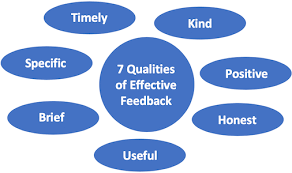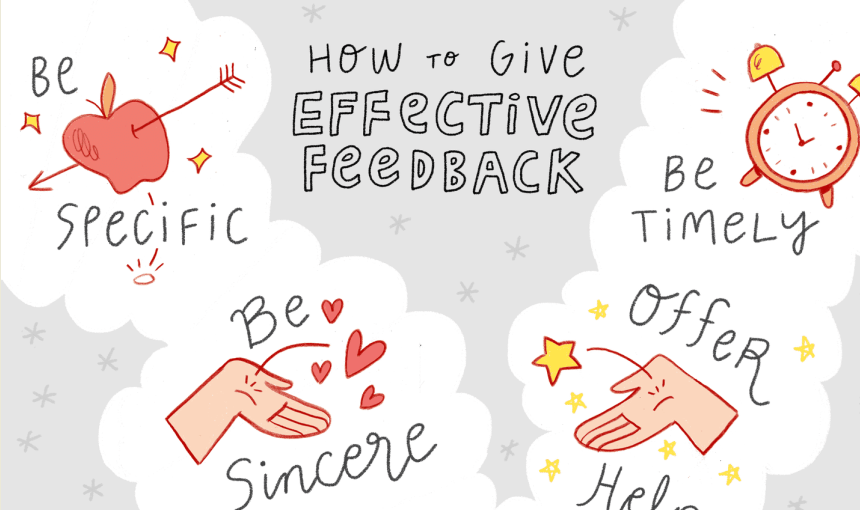Contents
One of the most popular topics of recent times is the issue of giving effective feedback along with concepts such as coaching, mentoring and quiet quitting. Well, if you are not new to business life, you may have noticed that the feedback culture is not fully established even in corporate companies worldwide. In other words, we have a lot of way to go in terms of giving feedback in general globally. In this regard, it is clear that there are issues that need to be improved for both sides of the interaction.
It is clear that on the one hand, the person who receives the feedback sees it as “criticism”, on the other hand, the person who gives the feedback often uses it as a weapon, sometimes even going as far as mobbing. At this point, we must state from the beginning that the most important thing in giving effective feedback is to communicate accurately, to empathize and to listen effectively.

In other words, no matter what sector you operate in, whether you are a blue- or white-collar employee, if your supervisor or manager does not listen to you and establish healthy communication, you will probably not be listening to what he says. In this regard, when we look at international sources, we generally see that there is theoretical information on this subject.
On the other hand, what those who do research on this subject or want to improve themselves need most is not just theory but examples and moreover real-life case studies. At this stage, below, we will tell you some topics about giving effective feedback with case studies.
Why Is Giving Feedback Important? Understanding Its Impact
There are institutions that research this issue both socially and academically and publish reports. In this concept, we will not go into deep and technical definitions and confuse you. It should be highlighted that giving effective feedback in its simplest and shortest form means conveying to the other party the aspects that need to be improved, without hurting him, and in a way that will contribute to his development. Our main purpose when giving feedback here should be to improve our colleague’s performance or contribute to his personal development.

At this step, please remember that the other person is a human being like you and their feelings will always be at the forefront. However, in this process, we must have data at hand and we must provide information to the other party in line with this data, avoiding personal subjective comments. So, for example, in order to give effective feedback regarding low performance, we must first present the low performance of an employee with data. Afterwards, we should talk about the impacts and results of this situation on the overall performance of the team or company.
Of course, it is necessary to support these with data. This way, your employee will focus on data-based facts, not your personal comments, and will probably not take this situation personally.
Preparing to Give Effective Feedback: Key Steps
Due to human nature, it is difficult to say negative things to him and make him accept them. Actually, even if your goal is to positively affect the personal development of the company or your teammate, none of us like criticism. However, giving effective feedback topic is now considered a necessity globally. So, if we’re going to do this, then let’s give effective feedback.
At that point, there are some stages or steps of making constructive criticism. It is important to know these.
Stages of giving effective feedback:
- Be sure to make pre-preparations.
- Write a story about the situation in your mind and explain it in the most accurate way possible.
- Rely on concrete and objective data.
- Do not go into personal characteristics.
- Do not add comments.
- The environment is very important, be one-on-one with the person.
- Focus on results. So, if improvement is achieved, show its benefit to the company.
- Give importance to open communication and ensure it.
- Ensure that a feedback tradition is created within the company.

Actually, the most important of these stages is narrating the story of the situation to yourself before giving feedback. That is, experiencing the event in your mind first and then objectively explaining the situation to your colleague based on the data. In line with that if the person understands and feels that your intention is to improve his and the company’s performance while you are talking, then the job is done. It means you have achieved success. On the other hand, if the other party does not understand your purpose or says himself: “His intention is only to criticize me.” From that moment on, he will completely close himself off to you and will not listen.
Giving Effective Feedback Tips
At that moment, if the other person’s eyes narrow or gives you a bad look, it means he is not listening to you anymore. When you feel this, take a break or stop talking. Because what you say from now on will not benefit him, you, or your company. Of course, these explanations should not scare you. If you follow the right steps and approach your colleague correctly, the result will probably be very successful.
Please, rely on data, communicate accurately, and speak in an area where other people can’t hear you.
At this point we need to point out that; Perhaps the other party will not understand or listen to you no matter how successful you go. In this case, give him some time and give up hope from him if it happens again and again. In this regard, we would like to point out that it is not possible to be 100% successful in giving effective feedback. It is obvious that sometimes we will experience defeats in this struggle. There are these in life, this is normal.
Feedback Best Practices for Leaders and Managers
You have probably read similar things we have explained up to this point on the internet or in personal development books. From here on, we will explain detailed examples of giving effective feedback based on special information that you cannot find anywhere, that is, real stories. Let’s say you are a sales manager in a private company and performances of a sales representative who used to have a very good sales performance has been in decline in recent months.

This is an event that happened and unfortunately its results were negative.
In this example, our manager called for the sales representative and gave a harsh warning, stating that his declining performance was also dragging down the team’s sales figures and lowering the average of the company. The employee in question was later seen with red eyes during the day. Apparently, this caused him to cry.
So, what should we have done, in that situation if we face, we hear you ask? In this case, the correct action is to first make preliminary preparations for our colleague.
First, ask yourself these questions:
- Why might this person have fallen off in recent months when he was doing well before?
- Is there a problem in his private life?
- Could there be a health problem?
- How can I help as a supervisor?
- By what percentage have sales decreased in the last 3 months? (data)
- What is the impact of the decrease in sales on the company’s profitability?
Is He a Real Team Player?
After collecting such information and data thoroughly, let’s talk in an environment where there are only two of us and other people cannot hear. By the way, when we sit down with our employee, please do not forget to ask him what he will drink and how he is doing. Maybe he will start talking about his problems the moment you ask how he is doing. Please let’s give him a chance.

As another example, let’s consider an employee who stays away from his teammates and does not engage in social environments. His other friends will not like this situation. Such situations affect the overall performance of the team. We wouldn’t be surprised if this situation turns into a situation that will even affect the company’s turnover or profit. In such a situation, as a manager, pull this friend aside.
But instead of making harsh findings that include comments such as “Why do you seem so unsociable and distant from the team?”, we should ask him clarifying questions and try to understand the situation first. So, if this friend of ours has a sick relative for instance, our observations without knowing this would be inappropriate.
For example, you should try to open it by asking a question like: “I see you very sad or quiet lately. Is there anything special I should know about?” Additionally, to increase the synergy within the team, you should organize collective events in which we will include this employee. On the other hand, it is also possible that you cannot open our friend despite your best efforts. Maybe we need to remove this non-sales-oriented employee from roles based on team harmony. Instead, it would be more rational to use him in individual roles and operations-oriented positions.
